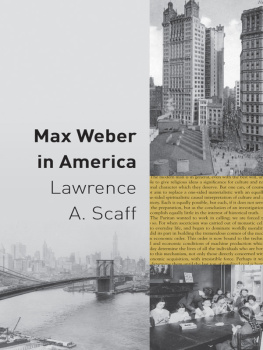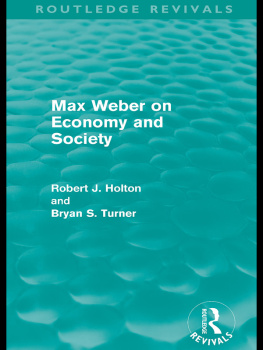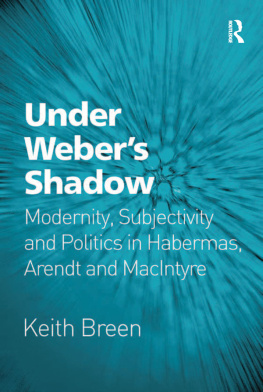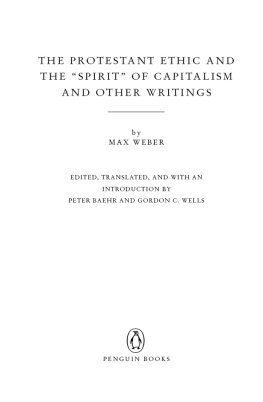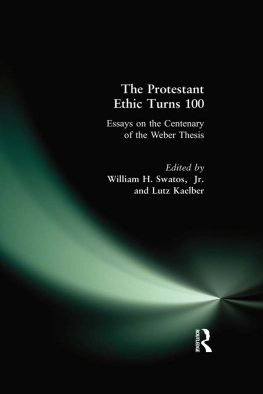Lawrence A. Scaff - Max Weber in America
Here you can read online Lawrence A. Scaff - Max Weber in America full text of the book (entire story) in english for free. Download pdf and epub, get meaning, cover and reviews about this ebook. City: United States, year: 2017;2012, publisher: Princeton University Press, genre: Science. Description of the work, (preface) as well as reviews are available. Best literature library LitArk.com created for fans of good reading and offers a wide selection of genres:
Romance novel
Science fiction
Adventure
Detective
Science
History
Home and family
Prose
Art
Politics
Computer
Non-fiction
Religion
Business
Children
Humor
Choose a favorite category and find really read worthwhile books. Enjoy immersion in the world of imagination, feel the emotions of the characters or learn something new for yourself, make an fascinating discovery.
- Book:Max Weber in America
- Author:
- Publisher:Princeton University Press
- Genre:
- Year:2017;2012
- City:United States
- Rating:4 / 5
- Favourites:Add to favourites
- Your mark:
- 80
- 1
- 2
- 3
- 4
- 5
Max Weber in America: summary, description and annotation
We offer to read an annotation, description, summary or preface (depends on what the author of the book "Max Weber in America" wrote himself). If you haven't found the necessary information about the book — write in the comments, we will try to find it.
Max Weber in America — read online for free the complete book (whole text) full work
Below is the text of the book, divided by pages. System saving the place of the last page read, allows you to conveniently read the book "Max Weber in America" online for free, without having to search again every time where you left off. Put a bookmark, and you can go to the page where you finished reading at any time.
Font size:
Interval:
Bookmark:

MAX WEBER IN AMERICA
MAX WEBER IN AMERICA
Lawrence A. Scaff
PRINCETON UNIVERSITY PRESS
PRINCETON AND OXFORD
Copyright 2011 by Princeton University Press
Published by Princeton University Press, 41 William Street, Princeton, New Jersey 08540
In the United Kingdom: Princeton University Press, 6 Oxford Street, Woodstock, Oxfordshire OX20 1TW
press.princeton.edu
All Rights Reserved
Library of Congress Cataloging-in-Publication Data
Scaff, Lawrence A.
Max Weber in America / Lawrence A. Scaff.
p. cm.
Includes bibliographical references and index.
ISBN 978-0-691-14779-6 (cloth : alk. paper) 1. Weber, Max, 18641920TravelUnited States. 2. SociologistsGermanyBiography. 3. SociologyUnited StatesHistory. I. Title.
HM479.W42S33 2011
301.092dc22 [B] 2010037523
British Library Cataloging-in-Publication Data is available
This book has been composed in Goudy Old Style
Printed on acid-free paper. 
Printed in the United States of America
1 3 5 7 9 10 8 6 4 2
For my daughters
Janine and Rosalyn
This is my second book about Max Weber, and until recent years I harbored doubts about writing it. Surely one contribution is enough in the vast sea of literature on Weber the man, thinker, scientist, and political intellectual. But the problems posed by Webers life and work are a source of endless fascination. There are a number of reasons to be fascinated: the emotional range and psychological drama of the life; the breadth and depth of the work; the sense that our times share something important with his world; the apparent centrality of Webers ideas to so many contemporary issues in science and politics; and, of course, the enduring questions about his most famous concepts, arguments, interpretations, and theses.
There are other reasons as well, however, for there is still a great deal we do not know about Weber and his life and writings and times. Despite the monumental efforts of the Max Weber Gessamtausgabe editors, we still do not have a complete published record of the correspondence and will not have that documentation for many years, if ever. Gaps persist in the critical edition of the published texts. Only in recent years, after nearly a century, have we recovered two texts Weber published in English translation in The Encyclopedia Americana in 19078. As for the historical period of Webers life and work, we may well have a more comprehensive and nuanced understanding of the quattrocento in Italy or seventeenth-century New England than we do of the Wilhelmine Era in Germany, the Progressive Era in the United States, and the important transatlantic ties forged in the West before the disaster of the Great Waressential especially for social policy, the arts and sciences, and intellectual life generally. Above all, the crucial American connection to Weber and the story of his 1904 journey to the United States, despite repeated prior attempts, have never been fully documented and understood.
In this investigation I propose to take up these textual and historical challenges, though in an unusual way by focusing on the American dimension to Webers work and experience. My first systematic treatment of Weber, Fleeing the Iron Cage, aimed for a comprehensive interpretation of his thought as a whole, juxtaposed to some of his most important contemporaries. This study is very different, for I use a particular focus in Max Weber in America to illuminate the thought, the life, and the historical eraespecially in the United States, but with an eye on Germany and Europe. Readers will notice the two senses of Weber in America, the literal and the metaphorical: his 1904 travels with Marianne Weber in the United States in the biographical pursuit not of the man but of the work itself, for what we still need most of all is a biography of the workor, if one prefers, a genealogy of the thinking that continues to challenge and provoke us.
My approach to the subject deserves an explanation. I have spent countless hours, days, and weeks in many archives in the United States and Germany, from the Knox County Public Library in Tennessee to the Prussian State Archives. It is a wonderful life, as Guy Oakes once said to me; if only the hours were better! For my interests (and considering the state of our knowledge) there is simply no substitute for reading the primary documentationletters, reports, newspapers, records of all kinds, some neatly transcribed or printed, others hurriedly scribbled and barely decipherable. These materials were often frustrating, but always stimulating, raising questions I had not considered previously. I was impressed by the amount of documentation there is, particularly in American state and county historical societies collections. Using such sources critically is essential, of course, and I hope that in doing so I have paid sufficient attention to the usual canons of scholarship and the interpretative literature, which for Weber alone would fill bookcases. I have dealt with the issue of sources and documentation by writing a readable narrative, uncluttered as much as possible by footnotes, endnotes, or other textual interruptions. Instead, I have included bibliographical essays for each chapter in which the relevant sources are identified.
There are conditions and contributions enabling this kind of work that I would like to acknowledge. It is a pleasure to express my appreciation to Guenther Roth, who has followed my work over the years, provided thoughtful comments and suggestions, defended the highest standards of scholarship, and supported this investigation with generous encouragement. He read the entire manuscript, assisting with a number of details. I also owe a special debt of gratitude to Wilhelm Hennis for his passionate engagement with Weber and his times. I benefited from conversations and correspondence with Edith Hanke and Keith Tribe, whose work assisted my own efforts. As general director of the Max Weber Gesamtausgabe, Edith Hanke assisted especially with the holdings of the Mohr-Siebeck Archive. I have enjoyed the counsel of numerous colleagues, among whom I would like to mention Kevin Anderson, Robert Antonio, Karl-Ludwig Ay, David Chalcraft, Uta Gerhardt, Peter Ghosh, David Kettler, Harold Orbach, Joachim Radkau, Alan Sica, Sandra van Burkleo, and Sam Whimster. Donald N. Levine arranged an affiliation at the University of Chicago that assisted my work in the Regenstein Library. Stephen Kalberg, Dirk Ksler, Laurence McFalls, Guy Oakes, and David Smith also expressed their interest in this project. Pat Riker and Marilee Scaff graciously donated their time as general readers of individual chapters. I am grateful to Pat Riker for her interest and support, and for the peaceful setting in Santa Monica, California, where much of the final text was writtenshadowed, so to speak, by an earlier generation of European immigrants to American shores.
The study that I have written could not have been accomplished without the Webers correspondence, both the nearly two hundred pages mailed home during the months in the United States, and the voluminous correspondence before and after the trip. The use of that handwritten correspondence is itself a challengeMariannes large, uniform, flowing, schooled, almost purely Stterlin script, and by contrast Maxs cramped, excitable, and highly individualized handwriting using a mixture of German and Roman scripts. If personality is revealed in the movements of the hand over the page, then here lies fertile ground for the analyst. As family members and other correspondents complained, reading Max Webers letters was not a matter of reading but of deciphering. Thanks to early tutorials from Manfred Schn of the
Next pageFont size:
Interval:
Bookmark:
Similar books «Max Weber in America»
Look at similar books to Max Weber in America. We have selected literature similar in name and meaning in the hope of providing readers with more options to find new, interesting, not yet read works.
Discussion, reviews of the book Max Weber in America and just readers' own opinions. Leave your comments, write what you think about the work, its meaning or the main characters. Specify what exactly you liked and what you didn't like, and why you think so.

